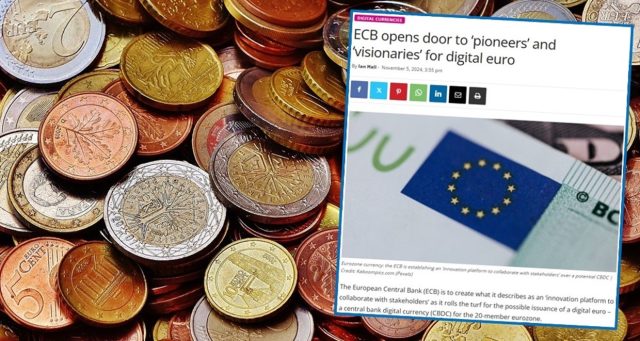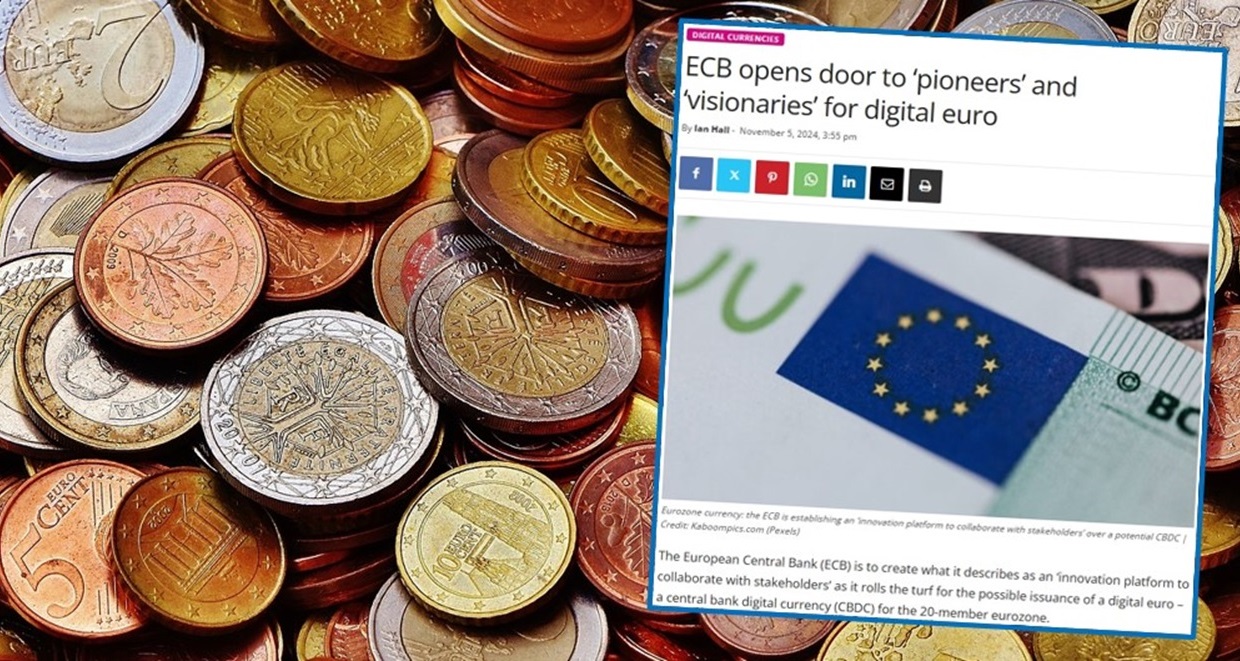 Digital euro: the ECB is about three quarters of the way through a ‘two-year preparation phase’ for a potential eurozone CBDC; (inset) our 5 November 2024 article on the ECB’s intention to establish the ‘innovation platform’ | Credit (main pic): Alexa (Pixabay)
Digital euro: the ECB is about three quarters of the way through a ‘two-year preparation phase’ for a potential eurozone CBDC; (inset) our 5 November 2024 article on the ECB’s intention to establish the ‘innovation platform’ | Credit (main pic): Alexa (Pixabay)The European Central Bank (ECB) has announced that it is engaging with about 70 private-sector organisations through a short-term ‘innovation platform’ created as part of its preparations for the possible issuance of a digital euro – a central bank digital currency (CBDC) for the 20-member eurozone.
The Frankfurt-headquartered authority is currently about three quarters of the way through a ‘two-year preparation phase’ for a potential digital euro. A decision on whether to actually issue a digital euro has not yet been taken.
The ECB announced just over six months ago that it would be establishing the innovation platform ‘to collaborate with stakeholders’ as part of its preparations for the CBDC, publishing a ‘call for expressions of interest in innovation partnerships’. The platform itself would ‘simulate the envisaged digital euro ecosystem’, with the ECB providing technical support and infrastructure for ‘European intermediaries to develop innovative digital payment features and services at European level.’
The ECB stated at the time that such stakeholders ‘may include small and large merchants, banks, other payment service providers, fintech companies, financial institutions, research institutes, technical experts and universities.’ In its update this week, it states that more than 100 applications were received, meaning that almost three-quarters of those that expressed interest are actually participating (we reproduce the ECB’s list of all participants at end of this article).
“The breadth and creativity of the proposals highlights the digital euro’s potential as a catalyst for financial innovation in Europe, including the development of new solutions that further enhance the payment experience for Europeans and create market opportunities,” said ECB Executive Board member Piero Cipollone.
RELATED ARTICLE ECB opens door to ‘pioneers’ and ‘visionaries’ for digital euro – a news story (5 November 2024) on the call for expressions of interest
Three main goals
The original call for expressions of interest set out three main objectives across two types of partnerships – ‘pioneer’ partnerships and ‘visionary’ partnerships. The 70 organisations have joined one or both of the workstreams.
The goals are: to demonstrate how conditional payments could be implemented on a technical level (‘i.e. between a simulated digital euro back-end and a front-end provider’); to provide the opportunity for participants to interact with simulated digital euro interfaces; and to ‘explore additional use cases, ideas and visions that stakeholders may have for the digital euro.’
Explaining what it meant by ‘pioneer partnerships’, the ECB stated that ‘pioneers will test how conditional payments could look like on a simulated technical infrastructure of a digital euro’. Conditional payments are payments that are made automatically when pre-defined conditions are met, such as the delivery of a package purchased online. This workstream has also been ‘developing potential use cases for day-to-day payments.’
The ECB stated that it ‘strives to share information about the current draft design of the digital euro with those who could become part of the digital euro ecosystem’ and that ‘raising awareness in this way will be another step towards establishing how the digital euro would work on a technical level.’
The project team would be aiming to ‘accommodate as many applicants as possible’, it stated, explaining that there would be ‘no selection process for pioneers but applications will need to be approved to ensure they comply with formal requirements.’ Pioneers would, it said, have a ‘standardised contract including data protection and IP rights and regulating promotional activities’, it continues, explaining that they will ‘be able to conduct technical testing based on their interests.’
The ECB said that those involved would expected to ‘implement conditional payments use cases using technical infrastructure that will be provided by the ECB’; that the initiative was ‘foreseen to run until May 2025’; and those involved would be ‘invited to’ submit an ‘outcome report’ by the end of that month.
RELATED ARTICLE European Central Bank gives nod to digital euro ‘preparation phase’ – a news story (18 October 2023) on the ECB Governing Council’s thumbs-up to progress to the current stage of the journey towards a potential eurozone CBDC
Report due ‘later this year’
The second cohort of partners, ‘visionaries’, would be conducting theoretical work to explore topics such as innovative use cases, ‘community impact and social factors involving multiple stakeholders with different backgrounds,’ the original notice explained.
‘The ECB encourages interested stakeholders to propose innovative use cases and explore their possible impact on communities, societal challenges and technological opportunities such as tokenisation,’ the notice stated. Tokenisation is the process of using new technologies, such as distributed-ledger technology (DLT), to issue or represent assets in digital form (known as tokens).
The ECB would ‘carefully consider all applications’, the notice continued, stating that ‘the most coherent applications that fit into the digital euro framework and have innovative potential will be selected for half-day workshops with the ECB digital euro project team.’
‘Every vision should outline how a concrete problem is solved by the digital euro or describe a challenge that has yet to be addressed,’ the ECB said. This week’s announcement mentions societal challenges such as digital financial inclusion, stating: ‘For instance, the ability to open a digital euro wallet in any post office could guarantee free access to digital euro services, even for people without a bank account or access to digital devices.’
Visionaries have been sharing and discussing their proposals with the ECB in workshops running until the end of this month (May). Findings from both workstreams will be published in a report ‘later this year’.
Global Government Fintech’s ‘Digital Currencies’ topic section
Framework agreements: latest
It is approaching 18 months since the ECB issued five calls for applications – carrying a total estimated spend of €432.1m (about £373m) and a potential maximum spend of more than €1bn (more than £862m) – to set up framework agreements with potential providers of digital euro ‘components and related services’.
All frameworks would run for a minimum four years, with a maximum contract duration of 10 years – or, in two cases, 15 years – according to a ‘calls for applications for digital euro component providers’ announcement in January 2024.
The procurement process, however, is yet to be completed.
In a speech (‘Empowering Europe: boosting strategic autonomy through the digital euro’) to the European Parliament’s Committee on Economic and Monetary Affairs last month (8 April), Cipollone described the ECB as being “in the middle of the procurement process to establish framework agreements with possible future providers of digital euro services”.
“The [digital euro] legislation is still under discussion and we won’t take a decision on issuing the digital euro before that process is complete,” an ECB spokesperson told Global Government Fintech this week. “This means that final contracts [on the framework agreements] will be possible only after that. In the meantime, though, the process to select providers is ongoing.”
DIGITAL EURO ‘INNOVATION PARTNERS’
(P) = pioneer workstream
(V) = visionary workstream
(B) = both workstreams
ABI Lab (B); Accenture GmbH (P); Associazione Prestatori Servizi di Pagamento (APSP) (P); Atruvia AG (P); Bank of Cyprus Public Company Ltd (P); Beelna d.o.o. (P); Berenberg Bank / Georg Heibel (P); BIZUM S.L. (B); bluesource – mobile solutions GmbH (P); CaixaBank, S.A. (P); Chain4Travel GmbH (P); CRMpartners Srl (P); Crunchfish Digital Cash AB (P); Diebold Nixdorf Holding Germany (P); Digiteal (P); Digi-Trade consortium (B); Dinit d.o.o. (P); DIUSFRAMI S.A. (B); DSGV (V); ECPA: European Card Payment Association (V); efsta IT Services GmbH (B); Efthymios Tzortzis (P); Emergent (P); equensWorldline SE (P); Erste Group Bank AG (V); ESMT European School of Management and Technology GmbH (P); euro Wallet GmbH (P); Everifin (P); eXyond S.r.l (V); Financial Engineering S.p.A. (P); Finansit as (P); Fluency (P); Fraunhofer-Institut für Angewandte Informationstechnik FIT (P); Funds On Chain GmbH (P); GFT Italia S.r.l. (P); Hermes Software GmbH (P); HYPE Spa (P); Iberpay (Sociedad Española de Sistemas de Pago) (P); Infineon Technologies AG (P); INIT GmbH & DPS Innovations GmbH (B); Kima Foundation Ltd (P); Kineox Solutions SL (P); KPMG AG Wirtschaftsprüfungsgesellschaft (P); Medical S.r.l.s (P); MONEI DIGITAL PAYMENTS S.L. (P); msg for banking ag (P); Next Digital Platform Srl (P); OC Payment GmbH “Paymenttools” (P); Opentech.com (P); Politecnico di Milano, Digital Innovation Observatory (V); PoMo Service GmbH (B); PostePay S.p.A. (V); Quant Network Europe Limited (P); Redsys Servicios de Procesamiento S.L. (P); Rein Network Limited (P); SAP Fioneer Solutions GmbH (P); SBS Software Ges.m.b.H. (P); Schwarz Corporate Solutions KG (B); SDA Bocconi School of Management (V); Senacor Technologies AG (P); Sirma Group Holding (P); Soda Labs and Nexellence Limited (P); Swisscom IT Service Finance S.E. (P); Taikonauten GmbH (V); Tata Consultancy Services Deutschland GmbH (B); Tchain LTD, COTI (P); TechAI Lab S.R.L. (P); Università Commerciale L. Bocconi, Fintech Lab Baffi Centre (V); Venturexpert Capital SAS (P); Xavier Lavayssière (P)
